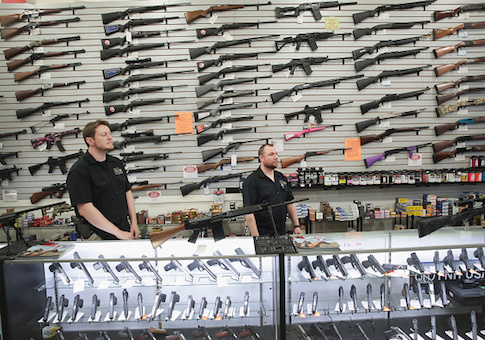America's leading gun-rights groups filed a pair of lawsuits challenging shutdown orders issued by the Democratic governors of New Mexico and Virginia.
The National Rifle Association, Second Amendment Foundation, and Firearms Policy Coalition (FPC) filed a federal suit against New Mexico governor Michelle Lujan Grisham (D.) on Friday over her emergency shutdown of gun stores. The Virginia Citizens Defense League and Gun Owners of America filed a suit in state court on Thursday over Gov. Ralph Northam's (D.) order to shutter indoor gun ranges. Both suits claim the emergency measures, meant to slow the spread of coronavirus, violate gun-rights protections and are especially worrying given the prisoner releases taking place across the country—including in New Mexico and Virginia.
"Politicians imperil our families by declaring our fundamental right of self-defense 'non-essential' while they free criminals," Jason Ouimet, executive director of the NRA's Institute for Legislative Action, said in a statement.
FPC president Brandon Combs said the Second Amendment is more essential than ever as states and localities divert law enforcement resources to cope with the deadly pandemic.
"The government has no duty to protect you, and coronavirus-related impacts to law enforcement could be significant," he said. "Times like now are precisely when people must be able to acquire self-defense tools to defend their lives and homes."
Neither Grisham nor Northam responded to requests for comment.
States began issuing stay-at-home orders in March, but policymakers have yet to resolve how such shutdown orders apply to gun manufacturers, ranges, or dealers. Gun-rights groups have aggressively challenged declarations that affect gun businesses in both state and federal courts, in an attempt to maintain public access to firearms.
Court rulings have had mixed outcomes so far, as judges weigh public health and emergency government power against constitutionally protected rights. In March, a North Carolina judge forced a county sheriff to reopen his pistol purchase permitting process, while the Pennsylvania Supreme Court allowed Governor Tom Wolf (D.) to move forward with gun store shutdowns. In April, two federal judges denied attempts to block shutdowns in parts of California.
Gun-rights advocates have had more success in lobbying federal and state officials to label gun businesses "essential" than they have had in the courts. The Department of Homeland Security updated its guidance to states at the end of March to add gun stores, ranges, and manufacturers to the "essential" list. Most states that initially shut down gun stores—including Pennsylvania, New Jersey, and Delaware—subsequently allowed the businesses to reopen on a limited basis.
Gun-control groups have launched a counteroffensive, asking government officials to shutter gun retailers. Everytown for Gun Safety and Brady United both issued memos encouraging state and local officials to ignore the federal guidance and eliminate gun sales during the pandemic. On Saturday, activists said temporary closures are needed to not only halt the spread of the virus but to slow the record-setting spike in new gun sales that the country witnessed in March.
"Keeping gun shops open during the pandemic will not only contribute to the spread of the virus, it will increase its deadly toll. Now is the worst time to be buying a gun and bringing it into the home," Griffin Dix, president of the group's Oakland chapter, wrote in an op-ed. "I strongly urge state and local officials to require gun shops to remain closed temporarily during this pandemic, like other nonessential businesses."
Alan Gottlieb, founder of the Second Amendment Foundation, said the gun-rights groups would continue to pursue legal action anywhere shutdowns occur, adding that even temporary restrictions on Americans' access to firearms are unconstitutional.
"Of course, there is an emergency, but such emergencies do not nullify the Constitution, even temporarily," he said. "We cannot allow public officials to put their personal agendas above the rights protected by the Constitution, and that includes the right of the people to keep and bear arms."
